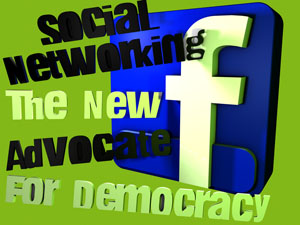Social networks fuel revolutions

Social Revolution::Graphic by Jonathan Krebs – State Hornet
April 6, 2011
There is nothing authoritarian regimes hate more than ideas, because ideas lead to revolution.
Throughout history, revolutions have occurred because of shared ideas through social networks of like-minded people. For instance, Thomas Paine’s little pamphlet, “Common Sense,” sparked the American Revolution by providing focus to the social woes of colonial days.
Today, though, revolution can happen virtually overnight through the power of the Internet.
Sites like Facebook and Twitter are becoming the medium for democracy movements around the world.
They offer an instant way to communicate and share ideas, photos and videos. People use the sites to organize and come together for a purpose.
When people get organized they can become a powerful force.
One of the most powerful aspects of the network is the ability to have instant worldwide communication. Some of the messages, photos and videos uploaded to the network have sparked just the right amount of outrage to push a population to revolution.
In 2009, Iranian protesters were able to share links, meeting places and other information using Twitter.
In fact, Twitter was such an important tool for the protesters that according to a June 2009 article in the New York Times, the U.S. State Department requested the site not be taken down for scheduled maintenance for fear that it would disrupt the ongoing protests.
Social networking is not the cause of revolution, but it is certainly a powerful tool in the revolutionary toolbox. It allows protesters to come together, and it allows the outside world the ability to see what’s going on in far-off places.
Unlike seeing conflict from the perspective of an American journalist, posts and uploads on the network represent personal voices and experiences from the people on the ground. The powerful and hard-hitting reality of unedited uploads can shock the conscience of the world, leading to quick intervention.
If social networking has the ability to spark revolution, does it also have the ability to be used as a propaganda tool by governments to shut down opposition? The potential is certainly there, but unlikely.
David Andersen, government professor, said the Internet is a “pull technology,” meaning people pull specific information that is important to them and ignore what does not interest them. Propaganda only works if the message is pushed on the people through more traditional media like television, radio and even textbooks.
“Social networking is probably more likely to create cloistered communities of similar people that pass on and share non-threatening information – at least to themselves – between each other,” Andersen said via email.
Although using social networking sites as a propaganda tool may be ineffective, governments can simply shut down the sites in order to prevent protesters and revolutionaries from using them to gain momentum.
In January the Egyptian government effectively shut down its connection to the Internet for almost a week in order to thwart protesters, according to a Wired.com article. The Associated Press reported that Libya shut down Internet access in March ahead of scheduled protests primarily aimed at cutting off information to the rest of the world.
Shutting down Internet access is a desperate and cowardly act of a regime that knows it is in trouble.
Obviously, authoritarian regimes understand the power of social networking. They know that one picture uploaded to a popular Twitter or Facebook page can spread to millions of people almost instantly, causing outrage to spark from across all corners of the world.
So, it is not surprising that the Hosni Mubarak regime in Egypt stopped its violence against protesters once video of the brutality made its way onto the Internet. Dictators and authoritarian leaders are finding it increasingly difficult to mistreat their citizens because once the world is watching, it is difficult to get away with brutality and genocide.
Dictators who choose to go ahead with violence and oppression will find that the world is less tolerant now that we can log onto the Internet and see exactly what they are doing.
Facebook and Twitter will continue to galvanize people throughout the world toward liberty and freedom. Democratic ideals will spread more easily, without government influence, but instead in an organic process that happens as a result of communication among millions of individuals.
When Mark Zuckerberg created Facebook I cannot imagine he ever could have seen his program as being a tool for revolution. Posts used to be “omigod I’m shoes shopping lolololololololol,” but now posts like, “Bring down the tyranny! To arms!” are leading to real action.
Revolutionaries around the world will continue to succeed in their missions to do away with the archaic governments of the past as long as enough people “Like” the pages they put up.
Maybe Zuckerberg should be nominated for the Nobel Prize.
Kelly Walters can be reached at [email protected].
















































































































































